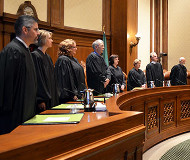7/18/2017
Washington Supreme Court Orders Return Of Seized BMWHigh court in Washington state says police cannot take cars and cash from motorists without specific evidence of a drug crime.

Police in Sunnyside, Washington were overzealous in taking the silver 2001 BMW 325i sedan and $5940 in cash from a man accused of exceeding the speed limit, the state Supreme Court ruled last month. Justices ordered the return of the car and money taken from Andreas Gonzalez on September 1, 2013 on the assertion that Gonzalez was a drug dealer.
The high court was not convinced. Gonzalez said he and a friend went to California to visit relatives. While there, he bought the BMW from a relative using borrowed funds. The cash he had on him came from a personal injury settlement after fracturing his back on the job, and he had the money with him to repay his friend. He had not yet registered the car in his name because it was the weekend. Gonzalez was driving on a suspended license (though the license was restored a few weeks after the stop), so he made matters worse by giving the officers a fake name.
"I was probably nervous, scared I'm gonna end up being arrested," Gonzalez explained.
He was indeed arrested. With permission, Sergeant Scott Bailey searched the car and found a "user's amount" of cocaine, less than an eighth of an ounce. A drug dog also alerted on the cash. This was what the city needed to grab the BMW because the situation fit the profile of a drug mule.
"It's not uncommon that a person be selected or offered a job to drive a vehicle that has... contraband from one place to the other place and they get X amount of money plus the vehicle they used to transport," Sergeant Bailey testified. "It's not an uncommon experience."
The lower courts were split on whether the city had proved its case, but the high court justices were unanimous in finding that prosecutors had only shown that Gonzalez was guilty of possessing drugs -- a crime that cannot be punished with forfeiture.
"The evidence presented could arguably support a finding that Gonzalez obtained his car and money through some kind of unlawful means," Justice Mary I. Yu wrote for the court. "However, there was no evidence to support a finding that Gonzalez obtained his property through the specific unlawful means of drug manufacturing or transactions as required by both the plain language and the underlying purpose of the forfeiture statute."
The high court doubted the relevance of the dog alerting on the cash, particularly since the cash was never subsequently tested for drug residue in a lab. The first hearing examiner improperly concluded that the dog alert meant that the money was "coated" in drug residue, which the justices found was a finding not supported by the evidence.
"Appellate review must be sufficiently robust to ensure that an order of forfeiture is in fact supported by substantial evidence so as not to deprive people of significant property rights except as authorized by law," Justice Yu concluded. "This is particularly important in the forfeiture context because an individual may lose valuable property even where no drug crime has actually been committed, and because the government has a strong financial incentive to seek forfeiture because the seizing law enforcement agency is entitled to keep or sell most forfeited property."
The justices also awarded attorney's fees to Gonzalez. A copy of their decision is available in a 750k PDF file at the source link below.


